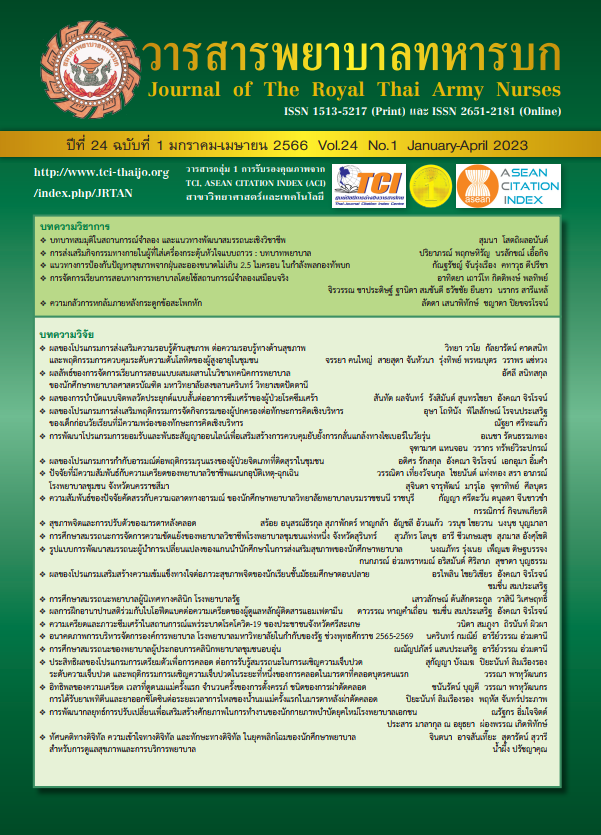The Effectiveness of Childbirth Preparation Program on Self-Efficacy in Pain Coping, Pain Level, and Pain Coping Behavior in the First Stage of Labor among the First Time Mothers
Keywords:
Childbirth Preparation Program, Self-Efficacy in Pain Coping, Pain Coping Behavior, First Time MothersAbstract
This study was based on a quasi-experimental research design aimed at studying the effectiveness of childbirth preparation program on self-efficacy in pain coping, pain level, and pain coping behavior in the first stage of labor among the first time mothers. The sample was 53 primiparous women who came to use services at the antenatal care department, Rachapiphat Hospital. They were divided into the control group with 26 subjects and the experimental group with 27 subjects. The control group received routine care only while the experimental group received the childbirth preparation program and routine care. Data were collected by using the Demographic Data Questionnaire, the Childbirth Data Recording Form, the Childbirth Self-Efficacy Inventory Questionnaire, the Visual Analogue Scale, and the Pain Coping Behavior Observation Form. Data were analyzed by using descriptive statistics, Fisher’s exact test, and Mann-Whitney U Test.
According to the findings, the experimental group had higher self-efficacy in pain coping, lower pain
levels during labor, and better pain coping behavior than the control group with statistical significance (p<.001).
Based on the findings, the researcher offers the following recommendations: It should be used to develop
innovative childbirth preparation programs to enhance self-efficacy in pain coping among maternity. To help
reduce the workload of nurses during COVID-19, such as building an application or designing it as a QR code.
References
Medforth J, Ball L, Walker A, Battersby S, Stables S. Oxford handbook of midwifery. 3nded. Oxford, United Kingdom: Oxford University Press; 2017.
Schwartz L, Toohill J, Creedy DK, Baird K, Gamble J, Fenwick J. Factors associated with childbirth self-efficacy in Australian childbearing women. BMC Pregnancy and Childbirth 2015;15(29):1-9.
Cunningham FG, Leveno KJ, Bloom SL, Spong CY, Dashe JS, Hoffman BL, et al. Williams obstetrics. 25thed. New York: Mc GrawHill Education; 2018.
Sansiriphun N. Fear of Childbirth. Nursing Journal 2013;40 Suppl:S103-S12. (in Thai)
Pan PH, Booth JL. The pain of childbirth and effect on the mother and the fetus. In: Chestnut DH, Wong CA, Tsen LC, Kee WDN, Beilin Y, Mhyre J, et al, editors. Chestnut’s obstetric anesthesia e-book. 7thed. Chicago: Elsevier Health Sciences; 2022. 422-40.
Kittisakchai T, Sansiriphun N, Kantaruksa K. Fear of childbirth in pregnant women and related factors. Nursing Journal 2013;40 Suppl:S12-S21. (in Thai)
Khosuk C, Anusornteerakul S. Nursing care to reduce fear of childbirth. Journal of Nursing Science and Health 2017;40(3):160-70. (in Thai)
Bandura A. Self-efficacy: The exercise of control. New York: W. H. FreeMan and Company; 1997.
Sinlatamkij C, Sinlatamkij S, Supaksri P. Effects of labor support program on pain-coping behavior and childbirth experience among primiparous women who received oxytocin. Journal of The Royal Thai Army Nurses 2019; 20(1):216-25. (in Thai)
National Statistical Office. Information and communication technology statistics. 2021. (in Thai)
Gao LL, Larsson M, Luo SY. Internet use by Chinese women seeking pregnancy-related information. Midwifery 2013;29(7):730–5.
Tanglakmankhong K, Perrin NA, Lowe NK. Childbirth self-efficacy inventory and childbirth attitudes questionnaire: Psychometric properties of Thai language versions.Journal of Advanced Nursing 2011; 67(1):193-203.
Lowe NK. Maternal confidence for labor: Development of the childbirth self-efficacy inventory. Research in Nursing & Health 1993;16(2):146-9.
Arayajaru P, Serisathien Y, Yusamran C, Phahuwatanakorn W. Impact of a educating programme on teenage first-time mothers’ childbirth anxiety, pain levels and pain-coping behavior. Thai Journal of Nursing Council 2012;27(3):96-108. (in Thai)
Baosoung C.Effects of structured and exposure counseling on reducing anxiety and stress coping behavior during childbirth [Dissertation]. Bangkok: Mahidol University; 1983. (in Thai)
Ittichaikulthol W.Clinical guidance for management of acute postoperative pain management/The Royal College of Anesthesiologists of Thailand together with the Pain Education Association of Thailand 2011;1(1):1-58. (in Thai)
Rahimparvar SFV, Hamzehkhani M, Geranmayeh M, Rahimi R. Effect of educational software on self-efficacy of pregnant women to cope with labor: A randomized controlled trial. Arch Gynecol Obstet 2012;286(1):63-70
Wadyim N, Ratinthorn A, Phahuwatanakorn W, Kovavisarach E.Impact of music on primigravidae’s mental images of pain and pain-coping behaviour during the first stage of labour. Thai Journal of Nursing Council 2014;29(1):95-107. (in Thai)
Downloads
Published
How to Cite
Issue
Section
License
Copyright (c) 2023 Journal of The Royal Thai Army Nurses

This work is licensed under a Creative Commons Attribution-NonCommercial-NoDerivatives 4.0 International License.
บทความหรือข้อคิดเห็นใดใดที่ปรากฏในวารสารพยาบาลทหารบกเป็นวรรณกรรมของผู้เขียน ซึ่งบรรณาธิการหรือสมาคมพยาบาลทหารบก ไม่จำเป็นต้องเห็นด้วย
บทความที่ได้รับการตีพิมพ์เป็นลิขสิทธิ์ของวารสารพยาบาลทหารบก
The ideas and opinions expressed in the Journal of The Royal Thai Army Nurses are those of the authors and not necessarily those
of the editor or Royal Thai Army Nurses Association.





